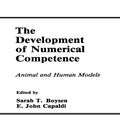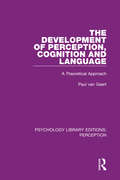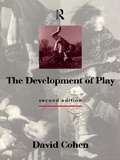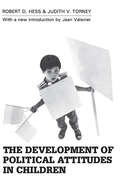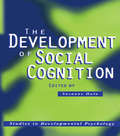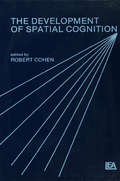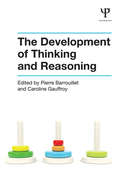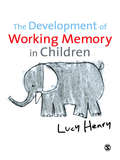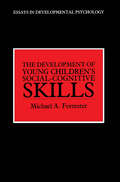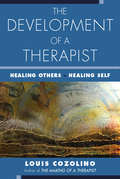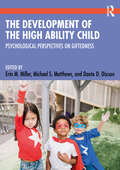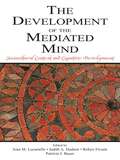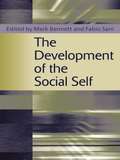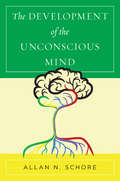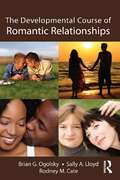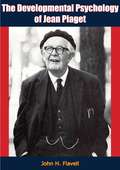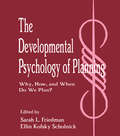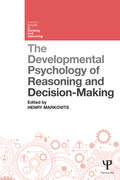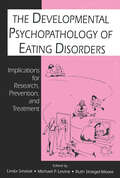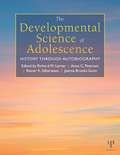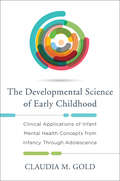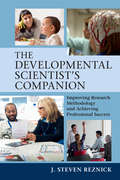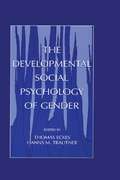- Table View
- List View
The Development of Numerical Competence: Animal and Human Models (Comparative Cognition and Neuroscience Series)
by Sarah T. Boysen E. John CapaldiThe area of animal counting has historically been the subject of a long and colorful debate, but only more recently have systematic, more rigorous experimental efforts to evaluate numerical abilities in animals been undertaken. This volume contains chapters from investigators in a range of disciplines with interests in comparative cognition. The studies described characterize the emergence of number-related abilities in rats, pigeons, chimpanzees, and humans, bringing together -- for the first time in one volume -- the rich diversity of cognitive capabilities demonstrated throughout many species. The data and theoretical perspectives shared will likely serve to provoke much thought and discussion among comparative psychologists and fuel new research and interest in the field of animal cognition.
The Development of Perception, Cognition and Language: A Theoretical Approach (Psychology Library Editions: Perception #9)
by Paul van GeertOriginally published in 1983, the aim of this book was to discuss some fundamental problems of cognitive developmental psychology at the time. The theme which underlies the discussion is that scientific knowledge of the cognitive characteristics of other people starts from the cognitive instruments that we psychologist employ, viz. our theories, models, assumptions, methods of enquiry etc. Thus our scientific cognitive equipment not only provides the format in which cognition in other people is expressed, it also exemplifies, in some abstract sense, this cognition. The first part of the book deals with the concept of development in relation to the structure of developmental theories. It is argued that theories originate from (implicit) conceptual analyses of (implicit) final state definitions. Starting from this specific view on the nature of developmental theories, the second part of the book discusses perception and perceptual development.
The Development of Personality (Collected Works of C. G. Jung)
by C.G. JungThough Jung's main researches have centred on the subject of individuation as an adult ideal he has a unique contribution to make to the psychology of childhood. Jung repeatedly underlined the importance of the psychology of parents and teachers in a child's development and he emphasized that an unsatisfactory psychological relationship between parents may be an important cause of disorders in childhood. He maintained that all real education of children needs teachers who not only know how to learn but who can also develop their own personalities. Jung devotes a large part of the book to expounding his views on these important subjects. There is also an outline of the theory of child development, a delightful snapshot from the life of a girl called Anna and her parents, and a stimulating discussion of marriage as a psychological relationship. Finally there is a chapter on child development and individuation.
The Development of Play
by David CohenPlay is an important part of our development. In playing, we learn to move, think, speak and imagine, as well as cope with other people. This second edition of The Development of Play addresses these key functions that play serves. David Cohen examines how children play with objects, with language, and most importantly, with each other and their parents. He goes on to ask why we stop playing, and looks at adult games. The Development of Play argues that psychology has accepted too uncritically the Victorian opposition of work and play, and argues that adults can learn to play more. With its extensive account of recent work in this area, this book is the most up-to-date work on the importance of play and will be of interest to child psychologists, developmental psychologists, and a wide number of professionals involved with children.
The Development of Political Attitudes in Children
by Judith V. Torney-PurtaBased on a study of 12,000 elementary school children in eight large and medium-sized American cities, this book presents the first large-scale study of political attitude formation in children. The authors view political development from the perspective of a general theory of socialization, and compare the influences of social class, intelligence, teacher attitude, and religious membership on the growth of political attitudes. The book outlines the way in which the child's political awareness evolvesfrom identification with authority figures such as father, policeman, the president, to a grasp of more abstract political concepts and the rudiments of political participation. Illuminating a topic of great theoretical concern and practical educational importance, the book is a significant contribution to the fields of political sociology, child development and educational psychology, and an important reference work for all concerned with the processes of socialization and of attitude formation in general. The Development of Political Attitudes in Children was based on a major survey, the first of its kind, begun at the University of Chicago in 1960 to as certain information about the induction of children into the political life of the United States, to describe the nature of socialization into citizenship roles, and to examine pre-adult political learning and behavior in terms of other implications for the stability of the political system.
The Development of Social Cognition (Studies in Developmental Psychology)
by Suzanne HalaThe Development of Social Cognition presents a lively, up-to-date examination of both the classical issues and contemporary understanding of theory and research in social cognitive development. The initial chapters highlight one of the central, theoretical tensions in the field, which is whether the development of understanding people is fundamentally different from understanding things. Subsequent chapters are devoted to development across specific areas of social cognition from infancy through to adolescence. The text ends with a comprehensive examination of the development of moral aspects of social cognition.
The Development of Social Cognition and Communication
by Catherine S. Tamis-LeMonda Bruce D. HomerFor young children, two of the most important tasks they face are learning how to communicate and learning how to think about themselves and the social world around them. The premise of this book is that these two tasks are inherently linked. The communicative routines and language that children learn enable new modes of cognition, which in turn allow for more complex social interactions. The model of early child development that emerges is one in which equal importance is given to the socio-cultural context in which children are developing, and to the role played by children in actively constructing their own knowledge. The book is organized into four thematic sections, each introduced by an integrative overview. The first section, "Language and Cognition," examines the function of language in young children's lives. The second section, "Intentionality and Communication," explores young children's understanding of intentions and their verbal and non-verbal communication. The third section, "Theory of Mind and Pedagogy," examines the ways in which developments in cognitive and communicative skills transform children's participation in the process of teaching and learning. The final section, "Narrative and Autobiographical Memory," looks at the effects of narrative on young children's understanding of themselves and their world. This book will be of great interest to anyone concerned with young children's learning and development.
The Development of Spatial Cognition
by Robert CohenFirst published in 1985. Routledge is an imprint of Taylor & Francis, an informa company.
The Development of Thinking and Reasoning
by Pierre Barrouillet Caroline GauffroyThinking and reasoning are key activities for human beings. In this book a distinguished set of contributors provides a wide readership with up-to-date scientific advances in the developmental psychology of thinking and reasoning, both at the theoretical and empirical levels. The first part of the book illustrates how modern approaches to the study of thinking and reasoning have gone beyond the Piagetian legacy: through the investigation of avenues previously not explored, and by demonstrating that young children have higher capacities than was assumed within the Piagetian tradition. The second part focuses upon theoretical and empirical investigations of the interplay between logic and intuition in reasoning and decision making, and how these forms of thinking evolve with age, through the general framework of what is known as dual-process theories. Contrary to Piaget’s claim, it becomes apparent that elaborate adult reasoning could rely on some form of intuition. The Development of Thinking and Reasoning provides psychologists, educators and everyone interested in child development with an integrated and up-to-date series of chapters, written by prominent specialists in the areas of thinking, reasoning, and decision making.
The Development of Working Memory in Children (Discoveries & Explanations in Child Development)
by Dr Lucy HenryUsing the highly influential working memory framework as a guide, this textbook provides a clear comparison of the memory development of typically developing children with that of atypical children. The emphasis on explaining methodology throughout the book gives students a real understanding about the way experiments are carried out and how to critically evaluate experimental research.<P><P> The first half of the book describes the working memory model and goes on to consider working memory development in typically developing children. The second half of the book considers working memory development in several different types of atypical populations who have intellectual disabilities and/or developmental disorders. In addition, the book considers how having a developmental disorder and/or intellectual disabilities may have separate or combined effects on the development of working memory. <P> The Development of Working Memory in Children is for undergraduate and postgraduate students taking courses in development/child psychology, cognitive development and developmental disorders.
The Development of Young Children's Social-Cognitive Skills (Essays in Developmental Psychology)
by Michael A. ForresterUnderstanding how young children begin to make sense out of the social world has become a major concern within developmental psychology. Over the last 25 years research in this area has raised a number of questions which mirror the confluence of interests from cognitive-developmental and social-developmental psychology. The aims of this book are to consider critically the major themes and findings within this growing social-cognitive developmental research, and to present a new theoretical framework for investigating children's social cognitive skills. Beyond being the first major review of the literature in this area, this synopsis articulates why contemporary theoretical ideas (e.g. information processing, Piagetian and social interactionist) are unlikely ever to provide the conceptual basis for understanding children's participative skills.Building upon ideas both within and beyond mainstream developmental psychology, the "eco-structural" approach advocated seeks to draw together the advantages of the ecological approach in perceptual psychology with the considerable insights of the conversational analysts, child language researchers and Goffman's analysis of social interaction. This convergence is centred around the dynamic and participatory realities of engaging in conversational contexts, the locus for acquiring social cognitive skills.The framework provides the building blocks for models of developmental social cognition which can accommodate dynamic aspects of children's conversational skills. This book then is a review of an important area of developmental psychology, a new perspective on how we can study children's participatory social-cognitive skills and a summary of supporting research for the framework advocated.
The Development of a Therapist: Healing Others - Healing Self
by Louis CozolinoA conversational and practical guide to the next level of professional development. Louis Cozolino, one of our most compelling clinical writers, takes us inside the mind and heart of a seasoned therapist, carrying on the tradition of personal and professional writing begun in The Making of a Therapist. This book discusses some of the more abstract concepts and ways of interacting with clients such as relaxed curiosity, finding the secret ally, and discovering the deep narrative. Also addressed are clinical concepts such as related states of mind, the process of change, free-floating attention, and listening with the third ear. More than just theoretical commentary, the book offers concrete clinical advice for the experienced therapist and brings a fresh perspective to some of the most current clinical challenges including the complexities of executive functioning; treating clients with internet addiction; and taking responsibility for your continued personal growth, clinical supervision, and education after leaving school.
The Development of the High Ability Child: Psychological Perspectives on Giftedness
by Michael S. Matthews Dante D. Dixson Erin M. MillerThis valuable text will help readers to understand the physical, social, and cognitive development of high ability children. Written by experts in the fields of education and psychology, each chapter applies core principles of psychology to the development of gifted and talented children. Through the content, readers will be shown how these children are like all children as well as the ways in which their development is unique. Covering the psychology of learning and learners, personality differences, language and physical development, problem solving, and motivation of high ability children, this book provides readers with a strong foundation for supporting and developing advanced learners. The text also includes Field Notes and Eye for Diversity sections to enable readers to put into practice, and recognize, important issues being discussed. Throughout, the editors blend discussions of research with practical advice for individuals charged with nurturing children with advanced cognitive potential. It is an essential read for students, counsellors, administrators, therapists, and parents seeking to support high ability children and their needs.
The Development of the Mediated Mind: Sociocultural Context and Cognitive Development
by Joan M. Lucariello Judith A. HudsonThis volume is a festschrift for Katherine Nelson, an NYU professor who was a pioneer in infant perception and memory. The "mediated mind" is a term coined by Dr. Nelson and it refers to how cognitive development is mediated by the sociocultural context, including language and social interaction. The impact of Nelson's views on the sociocultural basis of cognition and her functionalist perspective on cognitive development are evident in the collection of chapters in this book. The contributors--all leaders in the field of cognitive development--examine ways in which cognition is embedded in everyday, meaningful activities and the role of social context and cultural symbol symptoms, such as language and text influence children's developing concepts and thought. The concept of the mediated mind is examined from a variety of perspectives, including research in concept development, memory development, language learning, the development of literacy, narrative analysis, and children's theory of mind. The significant contribution of this volume is that it addresses all aspects of the mediated mind. Memory--both autobiographical and event-semantic--theory of mind, mental representation, temporality, narrative, and metalinguistic awareness comprise the chapter topics. The breadth of topics represented is a tribute to the impact Nelson's vision has on many developmental "domains." The contributors acknowledge and honor her work. Her theory and research paved the way for the advances in understanding a mediated mind that are evident and that will continue to shape notions of how the human mind develops and evolves within a social, interactive world.
The Development of the Social Self
by Mark Bennett Fabio SaniDrawing upon the perspective of social identity theory, The Development of the Social Self is concerned with the acquisition and development of children's social identities. In contrast to previous work on self-development, which has focused primarily on the development of the personal self, this volume makes a case for the importance of the study of the social self - that is, the self as defined through group memberships, such as gender, ethnicity, and nationality. A broad range of identity-related issues are addressed, such as ingroup identification, conceptions of social identities, prejudice, and the central role of social context. Based on contributions from leading researchers in Europe, Australia and the US, the book summarises the major research programmes conducted to date. Furthermore, the closing chapters provide commentary on this research, as well as mapping out key directions for future research. With a unique focus encompassing both social and developmental psychology, The Development of the Social Self will appeal to a broad spectrum of students and researchers in both disciplines, as well as those working in related areas such as sociology and child development.
The Development of the Unconscious Mind (Norton Series on Interpersonal Neurobiology #0)
by Allan N. SchoreAn exploration of how the unconscious is formed and functions by one of our most renowned experts on emotion and the brain. This book traces the evolution of the concept of the unconscious from an intangible, metapsychological abstraction to a psychoneurobiological function of a tangible brain. An integration of current findings in the neurobiological and developmental sciences offers a deeper understanding of the dynamic mechanisms of the unconscious. The relevance of this reformulation to clinical work is a central theme of Schore's other new book, Right Brain Psychotherapy.
The Developmental Course of Romantic Relationships
by Brian G. Ogolsky Sally A. Lloyd Rodney M. CateRecipient of the 2014 International Association for Relationship Researchers Book Award! This multidisciplinary text highlights the development of romantic relationships, from initiation to commitment or demise, by highlighting the historical context, current research and theory, and diversity of patterns. Engagingly written with colorful examples, the authors examine the joy, stress, power-struggles, intimacy, and aggression that characterize these relationships. Readers gain a better understanding as to why, even after the pain and suffering associated with a breakup, most of us go right back out and start again. Relationships are examined through an interdisciplinary lens –psychological, sociological, environmental and communicative perspectives are all considered. End of chapter summaries, lists of key concepts, and additional readings serve as a review. As a whole the book explores what precipitates success or failure of these relationships and how this has changed over time. Highlights of the book’s coverage:Incorporates both cross-sex and same-sex romantic relationshipsExamines the roles of gender, race, class, culture, age, and sexuality in relationship developmentLooks at multiple types of romantic relationships in emerging adulthood, including dating and cohabitationExplores both positive and negative relational processesAnalyzes the latest and most important scholarship. The book opens with an introduction followed by a historical overview of the development of relationships. Next relationship development models are examined including the influence of social factors and the interaction of the partners involved. This volume examines how partners initiate romantic relationships, including infatuation, sexual attraction, and the impact of technology; how cohabitation affects the quality of the future of the relationship; and the individual, social, and circumstantial factors that predict stability or break-ups in romantic relationships. The book ends with an examination of the “dark side” of relationships, and suggestions for future research on romantic pairings. Intended as a supplement for advanced undergraduate or graduate courses in marriage and family, personal/close/intimate relationships, or interpersonal/family communication taught in human development and family studies, psychology, social work, sociology, communication, counseling and therapy, this book also appeals to researchers and practitioners interested in the romantic relationship processes.
The Developmental Psychology of Jean Piaget
by John H. FlavellJEAN PIAGET—best known as developmental psychologist but also philosopher, logician, and educator—is one of the most remarkable figures in contemporary behavioral science. For more than forty years he and his associates have been constructing, in bits and pieces across an enormous bibliography, a broad and highly original theory of intellectual and perceptual development. Like Freudian theory, with which one is tempted to compare it in certain respects, Piaget’s theoretical system is a detailed and complicated one, not renderable in a few mathematical or verbal statements. Unlike Freudian theory, however, the system in its totality has not been widely assimilated by others. The major purpose of this book is to present an integrated overview of Piaget’s achievements, an overview sufficiently detailed to do justice to the complexity of his theory and the variety of his experimental contributions. This introductory chapter is intended to explain why a book on Piaget is desirable—or at least why it was written—and to summarize the plan or organization which the book will follow. In order to put these matters in context and to set the stage for a detailed description of Piaget’s system, it may be useful to examine briefly the man himself—the chronology of his life and achievements.
The Developmental Psychology of Planning: Why, How, and When Do We Plan?
by Ellin Kofsky Scholnick Sarah L. FriedmanPlanning is defined as formulating an organized method for action in advance. Although people do not plan all the time and planning does not occur in every situation, planning skill is central to all human behavior. There are developmental differences in planning skill and in the motivation to plan. Even among adults, variations in the engagement in the planning process are affected by individual attitudes, beliefs, and goals. Planning also has a different meaning at various junctures in one's life. Yet despite the amount of research on planning, many of the studies have focused only on the cognitive processes that enable mature individuals to plan. A continued exploration of the developmental course of planning, this text attempts to situate cognitive aspects of planning in the context of the social and cultural environment and other psychological processes. Bringing together the contributions of developmental, organizational, and social psychologists, it explains how, when, and why we plan. Finally, it addresses various issues that pertain to the different aspects of planning, from formal problem solving to handling the demands of everyday life.
The Developmental Psychology of Reasoning and Decision-Making
by Henry MarkovitsLogical thinking is a critically important cognitive skill. It is not just essential for mathematical and scientific understanding, it is also of prime importance when trying to navigate our complex and increasingly sophisticated world. Written by world class researchers in the field, The Developmental Psychology of Reasoning and Decision-Making describes the ways that children learn to reason, and how reasoning can be used to overcome the influence of beliefs and intuitions. The chapters in this edited collection focus on the new, revolutionary paradigm in reasoning and cover the recent research on the development of reasoning in two important areas: Cognitive abilities required to reason well and how these abilities develop in children and adolescents. Recent empirical data showing the effect intuition and prior belief have on reasoning, even when the outcome is inappropriate. Different theoretical and empirical perspectives from recent Piagetian theory, mental models and gist processing are examined, along with empirical results looking at specific aspects of reasoning in children. The key theme of the book is to better understand how reasoning develops not only through examining ‘logical’ reasoning, but also the nature of the interactions between people’s intuitions and their reasoning abilities. The Developmental Psychology of Reasoning and Decision-Making provides an overview of the main theories and key empirical results related to the development of reasoning and should be of particular interest to students and researchers in developmental psychology and education, along with those in cognitive psychology.
The Developmental Psychopathology of Eating Disorders: Implications for Research, Prevention, and Treatment
by Michael P. Levine Linda Smolak Ruth Striegel-MooreAlthough eating problems--ranging from body dissatisfaction and dieting to anorexia nervosa or bulimia nervosa--can begin and typically have their roots in childhood, theory and research in developmental psychopathology and developmental psychology have not received substantial attention in eating disorders research. This book provides crucial background material from both fields, and then makes direct applications to numerous aspects of the field of eating disorders including theory, research, treatment, and primary prevention.This book was born out of a transaction between frustration and optimism. The frustrations reflected the limitations of current knowledge about eating problems and disorders. Etiological "causes" which are sensitive and specific to eating disorders have been elusive. Although there is some understanding of risk factors, little is known about protective factors. This has made prevention, among other things, difficult. Furthermore, the mechanisms underlying the association between risk factors and disordered eating are poorly understood. For example, it is known that women are at greater risk than men are, but clinicians are hard- pressed to get beyond gender-based speculations and demonstrate why this is true.The optimism grows from familiarity with the field of developmental psychopathology. It seems evident that this approach has much to offer the field of eating disorders. This book is an early step in the integration of developmental psychopathology into theorizing, research, treatment, and prevention of eating disorders. It addresses four specific goals:* to introduce the principles and methodologies of developmental psychopathology,* to review the work of developmental psychologists in several major areas of behavior relevant to understanding the causes, treatment, and prevention of eating disorders,* to apply developmental psychopathology principles to the area of eating disorders, both in the form of theoretical models and in specific areas/issues raised by developmental psychopathology, and* to discuss the implications of developmental approaches for prevention programs and treatments.
The Developmental Science of Adolescence: History Through Autobiography
by Richard M. Lerner Rainer K. Silbereisen Anne C. Petersen Jeanne Brooks-GunnThe Developmental Science of Adolescence: History Through Autobiography is the most authoritative account of the leading developmental scientists from around the world. Written by the scholars who shaped the history they are recounting, each chapter is an engaging and personal account of the past, present, and future direction of the field. No other reference work has this degree of authenticity in presenting the best developmental science of adolescence. The book includes a Foreword by Saths Cooper, President of the International Union of Psychological Science and autobiographical chapters by the following leading developmental scientists: Jeffrey Jensen Arnett, Robert Wm. Blum, Jeanne Brooks-Gunn, B. Bradford Brown, Marlis Buchmann, John Bynner, John Coleman, Rand D. Conger, James E. Côté, William Damon, Sanford M. Dornbusch, Nancy Eisenberg, Glen H. Elder, Jr., David P. Farrington, Helmut Fend, Andrew J. Fuligni, Frank F. Furstenberg, Beatrix A. Hamburg, Stephen F. Hamilton, Karen Hein, Klaus Hurrelmann, Richard Jessor, Daniel P. Keating, Reed W. Larson, Richard M. Lerner, Iris F. Litt, David Magnusson, Rolf Oerter, Daniel Offer, Augusto Palmonari, Anne C. Petersen, Lea Pulkkinen, Jean E. Rhodes, Linda M. Richter, Hans-Dieter Rösler, Michael Rutter, Ritch C. Savin-Williams, John Schulenberg, Lonnie R. Sherrod, Rainer K. Silbereisen, Judith G. Smetana, Margaret Beale Spencer, Laurence Steinberg, Elizabeth J. Susman, Richard E. Tremblay, Suman Verma, and Bruna Zani.
The Developmental Science of Early Childhood: Clinical Applications of Infant Mental Health Concepts From Infancy Through Adolescence
by Claudia M. GoldA practical distillation of cutting-edge developmental research for mental health professionals. The field commonly known as "infant mental health" integrates current research from developmental psychology, genetics, and neuroscience to form a model of prevention, intervention, and treatment well beyond infancy. This book presents the core concepts of this vibrant field and applies them to common childhood problems, from attention deficits to anxiety and sleep disorders. Readers will find a friendly guide that distills this developmental science into key ideas and clinical scenarios that practitioners can make sense of and use in their day-to-day work. Part I offers an overview of the major areas of research and theory, providing a pragmatic knowledge base to comfortably integrate the principles of this expansive field in clinical practice. It reviews the newest science, exploring the way relationships change the brain, breakthrough attachment theory, epigenetics, the polyvagal theory of emotional development, the role of stress response systems, and many other illuminating concepts. Part II then guides the reader through the remarkable applications of these concepts in clinical work. Chapters address how to take a textured early developmental history, navigate the complexity of postpartum depression, address the impact of trauma and loss on children's emotional and behavioral problems, treat sleep problems through an infant mental health lens, and synthesize tools from the science of the developing mind in the treatment of specific problems of regulation of emotion, behavior, and attention. Fundamental knowledge of the science of early brain development is deeply relevant to mental health care throughout a client's lifespan. In an era when new research is illuminating so much, mental health practitioners have much to gain by learning this leading-edge discipline's essential applications. This book makes those applications, and their robust benefits in work with clients, readily available to any professional.
The Developmental Scientist’s Companion
by Reznick J. StevenWritten by one of developmental science's foremost methodologists, The Developmental Scientist's Companion provides an engaging and accessible guide to the scientific techniques that have been devised to investigate human development. Adopting an original approach to what can be a dry yet essential topic, Reznick enlivens his coverage of key issues in developmental methodology - measuring psychological phenomena, assessing reliability and validity, experimental design, interviews and surveys, data collection and analysis and interpreting research results - with discussion of his own experiences of those various techniques, gained over a substantial research career. The Companion concludes with practical tips for improving the field and navigating a path to professional success. Reznick's 'behind-the-scenes' view of empirical research and career progression, told with wit, wisdom and insight, is essential reading for students and young researchers launching their careers in developmental science.
The Developmental Social Psychology of Gender
by Thomas Eckes Hanns M. TrautnerNumerous publications have addressed gender issues from a social or a developmental psychological perspective. This volume breaks new ground in advancing a genuine synthesis of theory and research from these two disciplines. Building on the premise that a full understanding of the multifaceted nature of gender can be achieved only through a wider focus on processes of development and social influence, the contributors examine theoretical approaches to gender development and socialization, gender categorization and interpersonal behavior, and group-level and cultural forces that affect gender socialization and behavior. The book will be of interest to students and professionals in social psychology, developmental psychology, gender studies, sociology, anthropology, and educational psychology.
